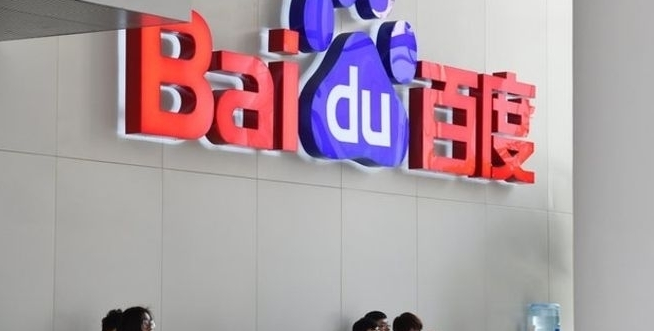(单词翻译:单击)
Baidu's victory has been struck out and it is now banned from similar competitions for a year
百度的胜利被宣布无效并被禁止参加类似比赛一年。
Chinese search giant Baidu has been disqualified from an artificial intelligence test in which it appeared to beat Google and Microsoft.
中国搜索引擎巨头百度在一次人工智能大赛中看上去赢了google和微软——然而最终被取消资格。
The test, in May, looked at how well computers recognise images.
这场在5月份举办的比赛,比的是计算机识别图像的能力。

But it has now emerged that Baidu submitted far more tests than the rules allowed, meaning its results were not comparable with others in the competition.
但是现在逐渐披露出来,百度进行了比规则规定所允许的次数多得多的测试,这意味着百度的结果无法与其他参赛者公平竞争。
The firm has apologised for "this mistake".
该公司已经为其"失误"而道歉。
Its win has now been cancelled and it has been banned from similar challenges for a year.
百度现在被取消成绩,并被禁止参加类似竞赛一年。
Rule-breaking
违反规则
Baidu claimed to have scored an impressive 4.58% error rate on a test which asked contestants to accurately recognise a series of images from a large picture database.
百度曾经宣称,在这场要求参赛者在一个大的图片数据库里正确识别一系列图像的比赛中,其错误率只有令人吃惊的4.58%。
Although Google and Microsoft were not far behind - with 4.94% and 4.8% error rates respectively - it was still regarded as a significant victory especially as Baidu is a relative newcomer to AI.
虽然google和微软并没有落后很多——这两家各自错误率分别为4.94%和4.8%——但百度的胜出仍然被认为是一个巨大的胜利,尤其是考虑到百度在人工智能方面是后来者。
But its victory turned out to be short-lived when, earlier this week, organisers of the ImageNet Large Scale Visual Recognition Challenge (ILSVRC) - run at Stanford University's vision lab - revealed that Baidu had broken its rules.
但这个胜利很短命,本周早些时候,ImageNet Large Scale Visual Recognition Challenge (ILSVRC)比赛的组织者——由斯坦福大学视觉实验室担当——发现百度违背了其规则。
"During the period of 28 November 2014 to 13 May 2015, there were at least 30 accounts used by a team from Baidu to the test server at least 200 times, far exceeding the specified limit of two submissions per week," it wrote.
"在2014年11月到2015年5月13日间,百度团队用了至少30个账号在服务器上测试了至少200次,远远超出所要求的每周2次",赛会组织者说。
It included some periods of very high usage - 40 submissions in five days during March.
这包括在一些时期内的高频率使用——3月份,百度在5天内就进行了40次测试。
In a statement Baidu said that it had been informed that "we exceeded the allowable number of weekly submissions to the ImageNet servers".
在一份声明中,百度说已获知"我们超过了所允许的每周连接ImageNet服务器测试的次数"。
"We apologise for this mistake and are continuing to review the results," it added.
"我们为所犯的错误道歉,并将继续检查结果"。
Dog breeds
狗的品种
ImageNet was set up as a resource for AI researchers and contains millions of pictures.
ImageNet为人工智能研究者创建了一个包含数百万幅图片的源。
Getting computers to accurately recognise the content and context of pictures is one of the key goals in the field of artificial intelligence and has obvious benefits for the search industry.
让计算机正确识别图片的内容和背景,是人工智能领域的一个关键目标,并且对于搜索业来说也有显而易见的好处。
The competition required competitors to arrange pictures into predefined categories and recognise small differences in images, such as different breeds of dog.
这次比赛要求参赛者把图片归类到预先定义的目录里面去,并且识别图片内容的细微差别,比如狗的品种。
For the test, Baidu used its deep learning supercomputer dubbed Minwa. In January, it said its computer vision system - Deep Image - was the world's "most accurate".
这次比赛中,百度启用了绰号为"Minwa"的深度学习超级计算机。一月份,百度说其计算机视觉系统——"Deep Image"——是世界上最准确的。
At the time of the competition victory, Baidu scientist Ren Wu claimed the firm was now "leading the race in computer intelligence".
在比赛获胜时,百度首席科学家吴恩达声称该公司现在已经"在计算机智能中领跑"。
Since the issue emerged, the AI world has been buzzing, with many leading experts asking for details about what happened. Baidu has offered no explanation beyond calling the incident a "mistake".
然而(违规)消息传出后,人工智能世界议论纷纷,很多行业尖端的专家询问事件的细节。百度除了把此事成为"失误"外没有给出其他解释。


